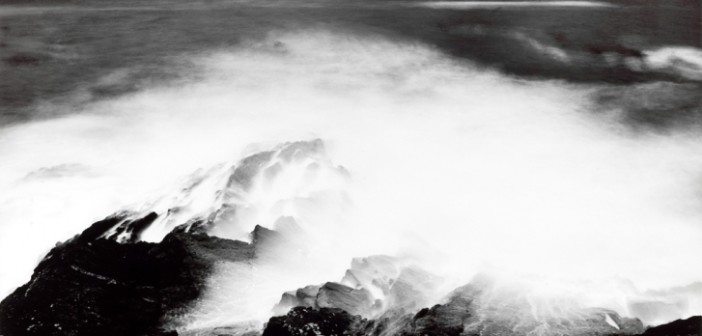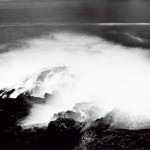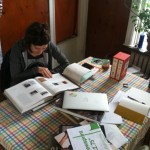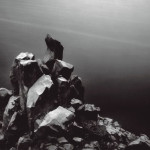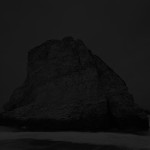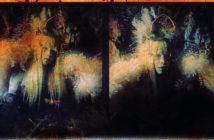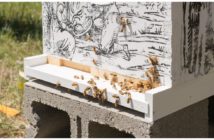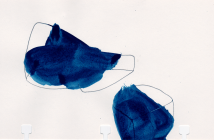I've been making progress on one of the RISD photography graduate thesis requirements: our thesis book. This book will contain our work, in images, as well as a text document that is to be part research paper, part personal investigation. It's kind of a great opportunity to make such a thing, though at times daunting. Since there is such a tradition of the photobook, the photography students get amped about participating in that, and the bar has been raised quite high by our predecessors. I met with a friend and artist and designer/book-maker/genius, Julia Gualtieri, who is going to collaborate with me on my project, and, I have to say, I haven't been this excited about my art for a long time. It's so fun to get excited about presentation, and this book can kind of be the ultimate articulation of that. I can't stop day-dreaming about squeezing my little book! Too bad I have to write many more pages before I can get too excited. Maybe dorking on the details is just another way to procrastinate, but book designing is insanely fun.
At RISD we are lucky to hear a lot of interesting folks come lecture. I wish there was a better way for the public to hear about these talks: they're posted on campus, and I'm sure there's a mailing list somewhere. If you're passing through Providence, look into it. Your favorite artist may be hanging out.
Last week, Thomas Joshua Cooper visited the photography department and gave a lecture on his work. Cooper is a master photographer and educator (he started the photography program at the Glasgow School of Art), and could be considered to be fairly classical in his approach (black and white landscapes). However, I found him to be one of the most conceptually motivated artists I've seen speak. His recent pictures were made over years of travelling long distances in search of the land extremities surrounding the basin of the Atlantic Ocean. The London gallery Haunch of Venison describes an exhibition of his project 'The World's Edge - The Atlantic Basin Project': "this first part of an epic adventure, Cooper's works seek to outline the memory of the landscape in a global history marked by the fruits and pitfalls of globalization." The images are rocky cliffs and the sea, clouds and ice, ranging from pure black darkness or completely white. He literally goes to the ends of the earth to make his work, a single picture from a 5x7" view camera, often hiring small boats, or in one case a plane flown by a young boy for a 6 pack of cola, to find the (nearly impossible to get to) geographical points of land that are at the continental extremities (northernmost, etc.). Extreme seems an understatement here. There's a nice, brief explanation of the image below in The Guardian.
 Thomas Joshua Cooper, Southernmost Point of the Cap-Vert Peninsula Near Dakar in Senegal, Westernmost Point of Continental Africa, 2004
Thomas Joshua Cooper, Southernmost Point of the Cap-Vert Peninsula Near Dakar in Senegal, Westernmost Point of Continental Africa, 2004I find his images powerful, strange, and confusing, even while they remain so simple and quiet. It doesn't make sense to me how they're made at all (tripod and Cooper + life suit, often chest deep in Arctic or Antarctic waters). Equally exciting was his incredible personality and the stories he told, and his passionate love of what he does. Cooper stood on stage in his winter coat, scarf wrapped around his neck, and spoke to a full auditorium for an hour and half + without pause. At times he'd speak with his eyes closed, and if I were to close mine I may have thought I was listening to The Old Man and the Sea audiobook (thanks Mo). He had a sage's wisdom, and hearing his Indiana Jones style adventures, his near-death experiences, just for a single picture (sometimes the final image being a purely white or black), kept me wide-eyed the whole time. He's on a hero's journey, and is comfortable with it taking his life, but I couldn't help think of his family—it must be unsettling to his wife and children. I'm sure it's a constant struggle for them, and it adds an urgency to the work. Cooper is a classic, and worth experiencing if you have the opportunity; an incredibly humble man that you'd never guess accomplished things no other human has. He has a dream to make a photograph standing in the Sea of Tranquility, on the moon, and I don't doubt that he'll make that happen.
A contemporary artist that's making work in a similar space to T.J. Cooper, is Adam Katseff. An early-career San Francisco Bay Area maker, who I've been comrades with for some ten years now. One of my favorite series of his is called Landscape. When encountering the work in person, you stand in front of these epic, dark prints. From afar perhaps it's just a black rectangle; then the image reveals itself to you, slowly. You start to make out a tree-lined mountain, the edge of water, or snow, and at times the spaces are recognizable, well-known landscapes come snapping together—perhaps a collaboration between your eyes and memory. The act of limiting, or pacing, our experience with the image creates a nice play. One starts to feel a sense of participation, it's definitely experiential. It's rare to be standing in true darkness, it can be unsettling, or as these images remind us, completely spectacular.
Adam and I also did our undergraduate studies together. We are collaborators, close friends, colleagues—we've kept pushing one another to continue making work since. He's a mentor to me, for sure. Cooper got me thinking a lot about mentors. My wife is an artist mentor at New Urban Arts (for highschool students here in Providence), and the role brings her so much joy. As makers, or as humans in general, we seek wisdom in others; it's essential, and it seems like the exchange is mutual and sustainable.
I definitely hold my own mentors close to the heart, but I wonder about how time passing changes peoples' approaches to this. It's harder for our mentors to surround themselves in myth, I think. We're not as trusting of long white beards, and maybe being cynical risks leaving us without these figures. For me, Thomas Joshua Cooper's stories are what it's all about, and again the pleasure seems mutual.
At dinner I asked Cooper, directly across the table, if he liked looking at students' work. He stared at me, above his glasses, steak knife clenched (still wearing his scarf and coat). His quiet, deep voice was unmistakably elevated, "Are you fucking kidding me?" he paused, "I'm a teacher. It means everything to me."
- Thomas Joshua Cooper, “Force Majeure”, The South Atlantic Ocean, Looking Towards Cabo San Juan from the “Lighthouse at the End of the World” Cabo Lasserre, Isla de Los Estados/Staten Island, Tierra Del Fuego, Argentina, 2008.
- Kitchen Book Design Meeting with Julia Gualtieri!
- Thomas Joshua Cooper, Southernmost Point of the Cap-Vert Peninsula Near Dakar in Senegal, Westernmost Point of Continental Africa, 2004
- Adam Katseff, Prisoner Rock, Pacific Coast, 2012

